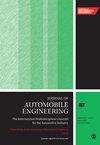基于强化学习的主动悬挂系统自适应内分泌 PID 控制
IF 1.5
4区 工程技术
Q3 ENGINEERING, MECHANICAL
Proceedings of the Institution of Mechanical Engineers Part D-Journal of Automobile Engineering
Pub Date : 2024-07-25
DOI:10.1177/09544070241262354
引用次数: 0
摘要
由于主动悬架系统能够实时适应各种路面和外部扰动,并具有控制车辆平稳性的潜力,因此近期的研究重点集中在主动悬架系统上。由于用于主动悬架控制的传统 PID 控制器的参数无法适应外部变化,因此存在一定的局限性,为了克服这些局限性,人们开发了模糊 PID 控制器。然而,模糊控制存在一些缺点,即需要手动定义模糊规则和变量。在本文中,提高 PID 控制鲁棒性的第一步是使用内分泌框架,该框架被认为在车辆悬架系统中具有高度的非线性和复杂性。然后使用深度强化学习算法来训练智能,为内分泌 PID 提供高效的自适应增益调整策略,而这并不需要主动悬架控制方面的先验知识。使用 ADAMS 对整车的动力学进行建模,分析车辆在不同速度和路面下的动态特性。结果表明,与被动悬架或模糊 PID 悬挂相比,基于深度强化学习控制的主动悬架能更有效地降低车身的垂直加速度,并在不牺牲动态悬架挠度或动态轮胎载荷的情况下更有效地提高乘坐舒适性。此外,该控制器在道路坡度和车速变化等条件下表现良好,表明其具有良好的泛化能力。本文章由计算机程序翻译,如有差异,请以英文原文为准。
Adaptive endocrine PID control for active suspension based on reinforcement learning
Recent research has focused on active suspension systems because of their real-time ability to adapt to a variety of road surfaces, external perturbations, and potential to control the smoothness of vehicles. Since the parameters of conventional PID controllers used for active suspension control have limitations due to their inability to adapt to external changes, the fuzzy PID controllers are developed to overcome such limitations. However, fuzzy control have certain disadvantages related to the manual definition of fuzzy rules and variables. In this paper, a first step in improving the robustness of the PID control is to use the endocrine framework, which is considered to be highly nonlinear and complex in the vehicle suspension system. A deep reinforcement learning algorithm is then used to train the intelligence to provide an efficient strategy for adaptive gain adjustment for the endocrine PID, which requires no prior knowledge of active suspension control. The dynamics of the whole vehicle are modeled using ADAMS to analyze the dynamic characteristics of the vehicle at different speeds and road surfaces. The results show that the active suspension based on deep reinforcement learning controlling reduces vertical acceleration of the body more effectively and improves ride comfort more efficiently without sacrificing dynamic suspension deflection or dynamic tire load as compared with passive suspension or fuzzy PID suspensions. Further, the controller performs well under conditions such as changing road grades and vehicle speeds, indicating a good generalization.
求助全文
通过发布文献求助,成功后即可免费获取论文全文。
去求助
来源期刊

CiteScore
4.40
自引率
17.60%
发文量
263
审稿时长
3.5 months
期刊介绍:
The Journal of Automobile Engineering is an established, high quality multi-disciplinary journal which publishes the very best peer-reviewed science and engineering in the field.
 求助内容:
求助内容: 应助结果提醒方式:
应助结果提醒方式:


